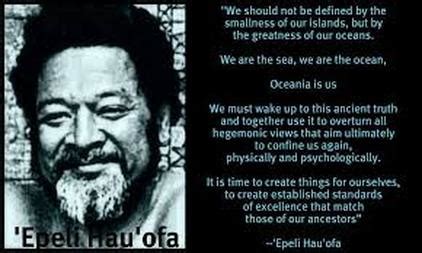A Quote by George Eliot
Our dead are never dead to us until we have forgotten them: they can be injured by us, they can be wounded; they know all our penitence, all our aching sense that their place is empty, all the kisses we bestow on the smallest relic of their presence.
Related Quotes
That the past is ahead, in front of us, is a conception of time that helps us retain our memories and to be aware of its presents. What is behind us [the future] cannot be seen and is liable to be forgotten readily. What is ahead of us [the past] cannot be forgotten so readily or ignored, for it is in front of our minds' eyes, always reminding us of its presence. The past is alive in us, so in more than a metaphorical sense the dead are alive - we are our history.
Whether we know it or not, we transmit the presence of everyone we have ever known, as though by being in each other's presence we exchange our cells, pass on some of our lifeforce, and then we go on carrying that person in our body, not unlike springtime when certain plants in fields we walk through attach their seeds in the form of small burrs to our socks, our pants, our caps, as if to say, 'Go on, take us with you, carry us to root in another place.' This is how we survive long after we are dead. This is why it is important who we become, because we pass it on.
As Indigenous peoples, we know there is more to the world. We know spirits exist. We know as women, because we're especially attuned to this kind of knowledge, that spirits exist and have a presence in our lives. Some of us are gifted and can communicate with the spirit world. Not everyone has that gift and can perceive the borders between the living and the dead and our society actively discourages us of exploring the knowledge of what many of us have already always known in our cultures.
There is a deep sense in which we are all ghost towns. We are all haunted by the memory of those we love, those with whom we feel we have unfinished business. While they may no longer be with us, a faint aroma of their presence remains, a presence that haunts us until we make our peace with them and let them go. The problem, however, is that we tend to spend a great deal of energy in attempting to avoid the truth. We construct an image of ourselves that seeks to shield us from a confrontation with our ghosts. Hence we often encounter them only late at night, in the corridors of our dreams.
A considerable percentage of the people we meet on the street are people who are empty inside, that is, they are actually already dead. It is fortunate for us that we do not see and do not know it. If we knew what a number of people are actually dead and what a number of these dead people govern our lives, we should go mad with horror.
My work to me is more like what the Native Americans say: When we walk upon the earth, we always place our feet very carefully upon the ground, because we know the faces of our future generations are looking up at us from below, and we never forget them. I think as a culture today we've forgotten them. This work is a way to help us remember them. It's a way for us not only to find meaning in our individual lives, but to extend that approach all across the planet. Because if we don't, we won't have a planet.
Where today are the Pequot? Where are the Narragansett, the Mohican, the Pokanoket, and many other once powerful tribes of our people? They have vanished before the avarice and the oppression of the White Man, as snow before a summer sun. Will we let ourselves be destroyed in our turn without a struggle, give up our homes, our country bequeathed to us by the Great Spirit, the graves of our dead and everything that is dear and sacred to us? I know you will cry with me, 'Never! Never!'
The greatest responsibility in this world that God has laid upon us is to seek after our dead. The apostle says, 'They without us cannot be made perfect'; for it is necessary that the sealing power should be in our hands to seal our children and our dead for the fulness of the dispensation of times-a dispensation to meet the promises made by Jesus Christ before the foundation of the world for the salvation of man.
We don't exist unless there is someone who can see us existing, what we say has no meaning until someone can understand, while to be surrounded by friends is constantly to have our identity confirmed; their knowledge and care for us have the power to pull us from our numbness. In small comments, many of them teasing, they reveal they know our foibles and except them and so, in turn, accept that we have a place in the world.
Our aim - our only aim - is to be at home in Christ. He's not a roadside park or hotel room. He's our permanent mailing address. Christ is our home. He's our place of refuge and security. We're comfortable in his presence, free to be our authentic selves. We know our way around in him. We know his heart and his ways. We rest in him, find our nourishment in him. His roof of grace protects us from storms of guilt. His walls of providence secure us from destructive winds. His fireplace warms us during the lonely winters of life. We linger in the abode of Christ and never leave.






































